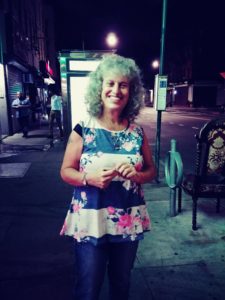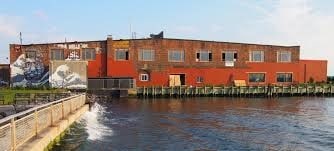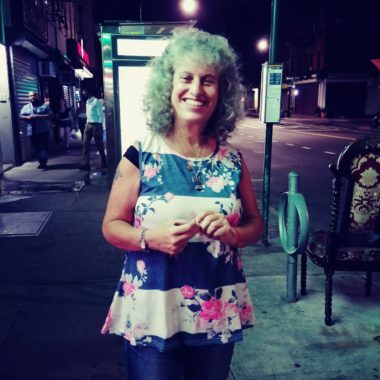When I was fourteen and already in love with New York City, where I spent vacations with my cousins in Queens, I got hold of a book called The Shook-up Generation, which was about New York street gangs. I had been fascinated with New York street gangs since I was 10 years old and read a magazine article about a Brooklyn gang called the Gowanus Boys. (Seeing West Side Story turned my fascination into a crazy obsession.) The Shook-up Generation begins with the great British journalist, Harrison Salisbury, describing his journey to the wilds of Red Hook on the F train, where he was greeted by a wall of graffiti that he called “a living newspaper of the streets.” He crossed Court Street and described the neighborhood he entered: “Ahead were the wharves, grim and empty on a Saturday…On the side streets (were) rows of three-story houses, most of them owned and occupied by their owners. Red petunias bloomed from window-boxes.” The “small town” atmosphere was deceptive because the area constituted the “turf” of a well-known street gang. “No one on this street is surprised to hear shots ring out after dark,” he wrote. “Or to see grim-faced, leather-jacketed youngsters leap into cars and roar off in the direction of Red Hook houses…”
I wouldn’t set foot in Red Hook for more than fifty years. But after I read Salisbury’s book an image of Red Hook lodged in my mind like a Jacob Riis photo. I pictured rough waterfront streets where teenagers banded together, playing hooky, swarming over the docks, scrawling their nicknames on playground and subway walls, blaring jukebox music in candy stores, and engaging in rumbles with zip guns and switchblade knives.
Native Brooklyners would sneer at this idealization of a poor neighborhood full of messed-up kids, and most older Red Hookers would point out that they themselves were good kids who skipped rope and rode bikes and played kick the can and went to school. But I didn’t identify with them. I identified with the bad kids. At home, I was the token rebel in a group of well-behaved academic kids, and when I misbehaved it was as a solo actor prowling around my orderly school and quiet suburban streets. I couldn’t imagine anything more glamorous than marauding through exciting city streets with a colorful gang of accomplices. What intensified my envy of gang kids was that I was gay, and of course closeted like all Midwestern gay kids back then. Not only was being a closeted teen horribly boring, because you couldn’t experience any of the sexual excitement of teenage life, but the real “me” was painfully invisible. In contrast, gang kids got all kinds of attention and were even written about in the newspapers.
After finding some of my coveted excitement in college during the Vietnam War, I dropped out after my junior year and moved to New York to be a writer. My best friend in high school moved here as well and we got an apartment on the Upper West Side. For the next five years we ambled through the detritus that was Manhattan in the 70’s, stepping over the dog shit, riding the graffiti-slathered trains, wandering the mean streets of Times Square, drinking and smoking weed, and listening to music while the Bronx burned up north and the raffish neighborhoods of Brooklyn loomed in the east. I was getting my fill of funky, dangerous New York, right there in Manhattan, and even though I was still intrigued with Red Hook it seemed as inaccessible as Shanghai. I got a liberal arts degree from the New School and started submitting stories to major magazines and getting rejection letters and becoming depressed by my inauthentic lifestyle, having drunken sex with men I could never love. Finally, I had a kind of breakdown and went to Cleveland for Thanksgiving vacation and stayed there for the next twenty years. I never officially moved back to Cleveland. I just got stuck there. I started writing for newspapers and magazines and ached with homesickness for New York but for some stupid reason I thought I couldn’t return until I wrote a book. There was no logic to this, except perhaps that I was afraid to be invisible in New York. Obviously, everyone is invisible in New York. Even famous people walk down the street unmolested. I guess I was just insecure about my portfolio of locally published articles that wouldn’t give me any street cred in the literary capital of the world.
I came out in a big explosion at the age of forty-four and fell madly in love with a woman from Cleveland who lived in the DC area. We were physically intimate, but she never wanted an actual relationship with me, even after I moved to DC to be near her. She just wanted to be friends, but I stayed in love with her for years, and she broke my heart over and over. Meanwhile, I wrote a book about coming out and falling in love for the first time, which became my debut, “Postcards from the Canyon.” After the book was published I started making plans to move back to New York, in all my authorial glory. But my mom had gotten old and I spent most of my spare time driving to Cleveland to be with her. I was devastated when she died, in the summer of 2013, but it freed me to finally go back “home.”
But this was the 21st Century, and I wasn’t going to live in Manhattan. I was going to live in Brooklyn. And if at all possible, I was going to live in Red Hook. My cherished image of Harrison Salisbury’s Red Hook had transformed into an updated image (based on voracious online reading) of a destination for the most adventurous New Yorkers, not typical urban gentrifies, but outliers like myself who liked the idea of living in an unpolished, post-industrial waterfront neighborhood, which also happened to be the site of the largest public housing development in Brooklyn.

One weekend I drove to New York and my cousin Barbara, who lives in Staten Island, drove me around Brooklyn so I could explore my options for affordable housing. I knew I couldn’t confine myself to Red Hook – affordable housing was scarce. We drove to Coney Island, which I’d always loved, but it was too far from the city. Crown Heights felt cluttered and disorganized, and Bed-Stuy looked like generic Brooklyn (which was just my subjective impression, not based on reality), and Bushwick felt stark and unwelcoming that day. I said to my cousin, “Let’s go to Red Hook,” and we drove across Brooklyn and onto Hamilton Avenue and turned onto Columbia Street. As soon as we made that turn I had the oddest sensation. I turned to my cousin and said, “This is it. This is where I’m going to live.” All Red Hookers know that the intersection of Hamilton Avenue and Columbia Street is nothing special. But for some reason, it felt familiar. It felt like home.
My apartment building used to be a school. It’s two blocks from the water and has high ceilings, hardwood floors, and big windows. I can see One World Trade Center from my window and walk down the street and look toward the water where the world’s greatest statue stands tall and proud. I know my neighborhood as well as I know my own home. I love the old brick buildings that still buzz with industrial activity. I love hanging out at the tip of Van Brunt Street where the water sloshes against the rocks and water taxis zip along the harbor. I love walking at night down quiet streets occupied by only one or two old houses, surrounded by (still undeveloped) wasteland. I love the funky independent businesses and the glow of Sunny’s Bar at night, and the ear-splitting groan of the Queen Mary, announcing its return to open waters. I love how people greet me wherever I go, often by name but always in that familiar way of people in Red Hook. Anyone who lives here, anyone who comes here, knows Red Hook’s mystique, and our greetings are kind of like a secret handshake.
Some of the gang boys that I envied way back when are still here. They sit on chairs in their yards with their dogs, looking grizzled and somewhat wistful. I guess you can get wistful in your seventies when so much of your life is behind you and so little ahead of you. I’m in my sixties, and I feel that way sometimes. But I’m happier than I’ve ever been in my life because I’ve come home. Thomas Wolfe was wrong. You can go home again. I’ve only been in Red Hook for four years, but it’s been my home since I was born.
If you believe in that sort of thing. Which I definitely do.










